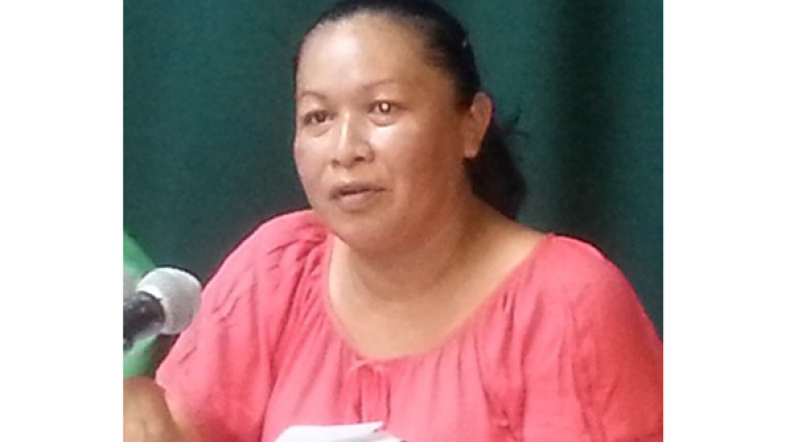A PARTNERSHIP for National Unity (APNU) Member of Parliament (MP) Dawn Hastings-Williams declared, Wednesday night, despite much praise from the Government benches for the “visionary” record-breaking $220B 2014 Budget, it had “shortcomings” in adequately addressing the needs of hinterland areas.She said: “This 2014 Budget seems to be suffering from a cataract. To my mind, it lacks a clear vision for the development of this country as a whole.
“…it could not be a better Guyana for all Guyanese when our brothers and sisters in the remote areas continue to moan about the high cost of living, lack of proper medical and other social services, for example the people at Kamarang, who have been suffering without power supply since July of last year and without water supply for many years.
“…we all know that there is a joint agreement between Guyana and Brazil and that information sharing had begun in the Upper Mazaruni last week and I am hoping that the residents do not have to wait until the hydroproject is materialised before they are given power supply. I hope not. I don’t know how many of us would like to live comfortably in such a place.”
In her contribution to the Budget Debate, Hastings-Williams stressed that it is the hinterland that brought people to Guyana (the search for El Dorado), besides sugar and rice.
“It is the golden frog, the Mighty Kaieteur, the gold rush…it is the giant arapaima and all the flora and fauna found in our hinterland that keep the revenues flowing into Guyana…it is our duty to ensure that the Government of the day takes care of the needs of our people in the hinterland, that is Regions 1, 7, 8 and 9,” she posited.
Many needs
The APNU Parliamentarian focused on the many needs, particularly in the social areas like education, health, employment, support for vulnerable children, sports, agriculture, housing and water and energy.
She said:“We continue to experience, as the years come and go and as the National Budget gets bigger year after year, the young in the hinterland continue to be denied equal access to education, over 20 years, as a Government, the PPP/C (People’s Progressive Party/ Civic) has failed to deliver quality education to our hinterland regions. I was hoping that this budget would have sought to improve this situation.”
The MP questioned whether there has been improved quality of lives for Guyanese in the interior locations.
“What direct impact has it had on the hinterland residents?” she asked.
According to her, there are still limited job opportunities for youths in the hinterland who have yet to be afforded the opportunity to access technical vocational training, whereby they can be empowered with appropriate skills to contribute meaningfully to the communities in which they live.
The APNU MP said: “What is happening, however, is that youths from Bartica, youths from a far community as Chinweing have to travel all the way to Georgetown or to Essequibo to acquire a trade or skill at a very high cost which their parents could hardly afford.
“…majority of the children who leave Waramadong Secondary School return home year after year, having been successful at one subject or two and having no second chance to equip themselves with technical or vocational skills, find themselves in the gold and diamond fields at a very tender age.”
Hastings-Williams also touched on the National School Feeding Programme, acknowledging its benefits and referring to a related World Bank report on a study undertaken by that lending institution.
Titled ‘Rethinking School Feeding; Social Safety Net, Child Development and the Education Sector’, it established that it was a valuable exercise that captured the most vulnerable in many countries.
However, she bemoaned the “measly” $175 that is paid per meal, as well as the $1,000 a day to the cooks providing the meals.
The APNU MP said:“The questions that come to my mind are: “Are the monies allocated for this venture adequate…what kind of balanced meal can you provide with $175 in these times to nourish the brain of a child who we expect to become literate and numerate in the end?”
She remarked: “This is what is being offered for a child. Not only that Sir. There are cooks who are being paid $1,000 a day for their cooking and would receive $20,000 for the month out of the same allocations given for the feeding programme.
New mathematics
“Now tell me comrades: what kind of new mathematics is this? These are all testimonies that testify to the continuous neglect of our children in the hinterland.”
Then she exhorted:“Stop neglecting our young people! I say stop making them want to run away from this beautiful Guyana in search for a better place to stay.”
Hastings-Williams also advocated value for money to ensure “real” meaningful development.
To this end, she pointed to the allocations for development in places like Bartica and emphasised the necessity for more; for Bartica to become a township with better roads, adequate water supply, improved street lighting and better banking services.
Hastings-Williams asked:“Is it not time for a child in Phillipai or Arrau or Paruima and Kako to be doing his research on the Internet? When exactly would this Government become serious about developing our rich hinterland?
“…we may continue to approve large sums of monies year after year and I believe that it is time we begin to evaluate and examine, as representatives of our people, to see if development is really taking place in our hinterland.”
On the issue of agricultural advances, the APNU MP mentioned the potential for hinterland agriculture to be boosted.
She said:“I have been saying to this House, repeatedly, that there is an agricultural potential in the Cuyuni-Mazaruni region. We can have cheap and abundant supply of healthy foods and a rich and diverse regional economy.”
Hastings-Williams acknowledged her recognition of the challenges faced by developing countries but suggested that realistic goals be set to truly achieve ‘A better Guyana for all Guyanese’.



.jpg)








